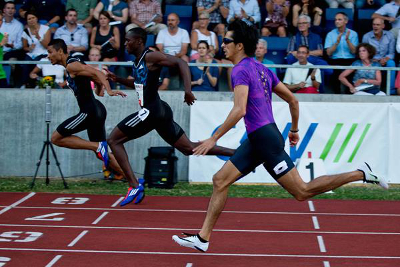
Photo: IAAF |
Wayde van Niekerk became the only South African, and the fourth athlete in the world, to clock sub-20-seconds in a 200 m race on Tuesday 14 July 2015. With this winning time, he became the fourth member of the prestigious quartet, consisting of Michael Johnson, LaShawn Merritt, Isaac Makwala and himself.
The Kovsie gold medallist’s ground-breaking performance saw him beat world-class 200 m specialist and last year's Diamond League race winner, Alonso Edward of Panama. Van Niekerk crossed the finish line half a metre ahead of Edward, who was followed by Fujmitsu Kenji of Japan in the third place.
Van Niekerk's 19.94-time at the Diamond League meeting in Lucerne (Switzerland) set a national record, and improved on his personal best. In 2010, he claimed the World Junior Championship title in Moncton, Canada, by covering 200 m in 21.02 seconds.
Recently, he made history by defeating the London 2012 Olympic Games champion, Kirani James, of Grenada in the Caribbean.
On 4 July 2015, he surged 0.79 seconds ahead of Kirani in his number five lane, becoming the first African to cover 400m in less than 44 seconds. The Kovsie student won the race at 43.96, occupying 10th place on the International Association of Athletics Federations (IAAF) Diamond League all-time list.
Kovsies were still celebrating the gold medalist’s South African record-setting time of 44.24 on 13 June 2015 when he dominated the Diamond League meeting. At the previous race in New York, Van Niekerk improved on his own national record of 44.38. With an impressive dash to the finish line at that particular event, he surpassed Christopher Brown’s 400 m record.
In addition to the country’s record, Van Niekerk made his name as one of the continent’s record-breakers. On 7 June 2015, he broke the 1986 African 300 m record. Van Niekerk replaced Ivorian Gabriel Tiacoh’s best time of 31.74 with a 31.63 championship win at the Birmingham Diamond League meeting. Simultaneously, he bettered Morné Nagel’s 2006 South African national record.
Following his outstanding performance, he was positioned in 10th place on the world list in the men’s 300 m.